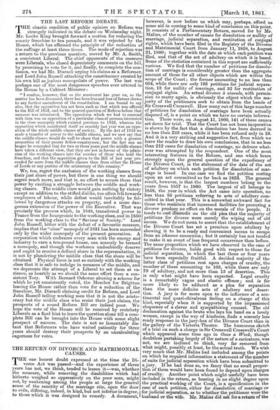THE LAST REFORM DEBATE. T HE chaotic condition of public opinion
on Reform was strangely indicated in the debate on Wednesday night. Mr. Locke King brought forward a motion for reducing the county franchise to ten pounds, and it was rejected by the House, which has affirmed the principle of the reduction of the suffrage at least three times. The mode of rejection was a return to the previous question, moved by Mr. A. Smith, a consistent Liberal. The chief opponents of the measure were Liberals, who closed depreciatory comments on the bill, by promising to vote for it, and finally, to complete the con- fusion, we had Mr. Disraeli urging his claims as a Reformer, and Lord John Russell attacking the constituency created by his own bill as jealous monopolists of power. The last was perhaps one of the most dangerous speeches ever uttered in the House by a Cabinet Minister : "I confess, however, that as the movement has gone on, as the matter has been discussed, there has been less and less of favour shown to any further amendment of the constitution. I am bound to say also, that the opposition has not been such as that which was offered to the Bill of 1832, and to the general question of Reform before that measure was introduced. The opposition which we had to contend with then was an opposition of a particular class of persons interested in the close monopoly which existed previous to 1832, whereas the opposition which manifested itself so sensibly last year was an oppo- sition of the whole middle classes of society. By the Act of 1832 we made a transfer of power to the middle classes, and we now say that the middle classes would do well to share that power with a greater proportion of their poorer fellow-countrymen; but the fact can no longer be concealed that for two or three years past the middle classes have taken a different view, that they are not in favour of the admis- sion of the working classes into the number of those who hold the franchise, and that the opposition given to the Bill of last year pro- ceeded far more from the middle classes than from either the House of Lords or any portion of the aristocracy of this country."
We, too regret the exclusion of the working classes from their just ;hare of power, but there is one thing we should regret much more, and that is, an effort to secure them that power by exciting a struggle between the middle and work- ing classes. The middle class would gain nothing by victory except an addition to the stifled dislike, too often felt towards employers of labour, while defeat would inevitably be fol- lowed by dangerous attacks on property, and a more dan- gerous extension of the power of the Executive. That was precisely the process which, in 1848, transferred power in France from the bourgeoisie to the working class, and in 1850 from the working class to the "Saviour of Society." Lord John Russell, bitter with the defeat of a favourite measure, implies that the "close" monopoly of 1831 has been succeeded only by the wider monopoly of the present generation. A corporation which embraces every man with the energy and industry to earn a ten-pound house, can scarcely be termed a monopoly, and though the workmen undoubtedly deserve and ought to receive a defined share in the representation, it is not by plundering the middle class that the share will be obtained. Physical force is not so entirely with the working class that it is safe to indulge in menaces of the middle, and we deprecate the attempt of a Liberal to set them at va- riance, as heartily as we should the same effort from a con- sistent Tory. With Bernard Osborne abusing a scheme for which he yet consistently voted, the Member for Brighton leaving the House rather than vote for a reduction of the franchise, Mr. Disraeli claiming credit for Reform, and Lord John Russell telling working men that it is not the aristo- cracy but the middle class who resist their just claims, the prospects of a sound Reform Bill are indeed poor. We hope the vote of the House will be received by crotchety Liberals as a final hint to leave the question alone till a com- plete Bill can be brought into the House with some slight prospect of success. The date is not so lamentably dis- tant that Reformers who have waited patiently for three years should destroy their prospects by an uncalculating eagerness for votes.






























 Previous page
Previous page